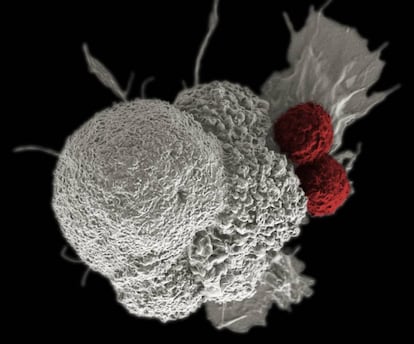Could a modified common cold virus some day cure cancer?
Spanish scientists are tweaking adenoviruses to make them attack the most lethal tumors in children and adults

Over a century ago, a few doctors observed that some of their patients were suddenly cured of leukemia after being naturally infected by a virus.
These spontaneous remissions were sadly anecdotal on a planet with 14 million new cases of cancer a year, but they were enough to fuel a century-long dream: to genetically modify viruses to attack and destroy tumoral cells, multiplying within them and feeding the treatment until the cancer is completely gone.
But reality turns out to be a lot harder than the theory, as evidenced by the first gathering of the newly created Spanish Adenovirus Network, which met in Madrid last month.
We can modify adenoviruses to make them act like biomedicines against some diseases
Carmen San Martín, researcher
Adenoviruses are everywhere. They cause common colds and diarrhea, but their characteristics also make them a versatile tool in the ongoing quest to destroy cancer.
“They are relatively easy to produce in large amounts and they have a large genome, with enough space to introduce the genes you are interested in,” explains Carmen San Martín, a researcher at the National Biotechnology Center and the coordinator of this network of 10 independent scientific groups.
“We can modify adenoviruses to make them act like biomedicines against some diseases,” she adds.

The biologist Marta Alonso is exploring this strategy, which is still at a very experimental stage. She is working on a tough front: brain tumors in children, which are highly lethal. Late this year she will begin a clinical trial with modified adenoviruses to attack diffuse intrinsic pontine glioma (DIPG).
“These are heartrending cases,” she says. “Right now, children with these tumors die within nine months.”
Her first results are moderately hopeful. Another trial with 30 adults suffering from gliomas – tumors that originate in the brain or spine – has turned up some positive results.
Sign up for our newsletter
EL PAÍS English Edition is launching a weekly newsletter. Sign up today to receive a selection of our best stories in your inbox every Saturday morning. For full details about how to subscribe, click here.
“We didn’t detect any toxicity; just a little fever at the most,” says Alonso, who works at Navarre University’s Clínica hospital. “You have to treat the data gingerly, because it’s still very early, but we have observed that 10% of patients respond to treatment with modified adenoviruses. It may seem like little, but it’s a lot. The prognosis for gliomas is usually death. The life expectancy of adults with glioma is 14 months.”
In some anecdotal cases, the brain tumors were “considerably” reduced. Alonso’s team is working to shed light on these victorious battles waged at the molecular level. One of their hypotheses is that, occasionally, “the virus drops like a bomb and makes the immune system start recognizing the tumor.”
Meanwhile, another biologist named Ramón Alemanyhas spent the last 20 years trying to materialize the dream of using adenoviruses against cancer. He notes that despite decades of research, only one adenovirus treatment has been approved in the entire world, and that was in China in 2005, to fight head and neck cancers caused chiefly by alcohol and tobacco consumption. Since then, no other drug has been approved.
“And the efficiency of that drug is not even proven using European and American criteria,” adds Alemany, of the Barcelona-based Catalan Cancer Institute.
Around 99% of experimental drugs against pancreatic cancer have failed
Ramón Alemany, researcher
This researcher lists the obstacles that remain: the adenovirus often fails to reach the tumor efficiently, and the body’s defenses neutralize it before it can shoot at the cancer. The enemy is gigantic.
Yet Alemany does get good news from time to time. His modified adenovirus Icovir-5 has been used since 2005 to experimentally treat 20 children with neuroblastoma, the second most common solid tumor in children. Using bone marrow cells from the children themselves, and infecting them with the modified adenovirus, much like a Trojan horse, the treatment has had positive results in five children. One of them has been cancer-free for 10 years.
Yet Alemany is asking people to curb their enthusiasm. Another one of his modified adenoviruses, Icovir-17K, has been tested on 24 adults, half of whom had colon cancer and the other half pancreatic cancer. In this case, the adenovirus was injected directly in the bloodstream.
“We see partial responses, but no remission, like we did see with the children,” he explains. “Right now we cannot conclude that our virus is contributing a clinical benefit. Around 99% of experimental drugs against pancreatic cancer have failed.”
Cristina Fillat, a biochemist conducting research on mice using modified adenoviruses against pancreatic cancer, is more upbeat. Fillat, of the Barcelona-based Pi i Sunyer Biomedical Research Institute, underscores that just a few months ago the European Union and the US approved the first oncolytic virus, the T-VEC. It is not an adenovirus, but a genetically modified lip herpes virus meant to stop the progression of melanoma, the most aggressive form of skin cancer. Patients with advanced melanoma who receive T-VEC treatment live an average of 41 months, compared with 21 for those wo get a control treatment.
Fillat thinks that approval of T-VEC represents a form of support for adenovirus research.
English version by Susana Urra.
Tu suscripción se está usando en otro dispositivo
¿Quieres añadir otro usuario a tu suscripción?
Si continúas leyendo en este dispositivo, no se podrá leer en el otro.
FlechaTu suscripción se está usando en otro dispositivo y solo puedes acceder a EL PAÍS desde un dispositivo a la vez.
Si quieres compartir tu cuenta, cambia tu suscripción a la modalidad Premium, así podrás añadir otro usuario. Cada uno accederá con su propia cuenta de email, lo que os permitirá personalizar vuestra experiencia en EL PAÍS.
¿Tienes una suscripción de empresa? Accede aquí para contratar más cuentas.
En el caso de no saber quién está usando tu cuenta, te recomendamos cambiar tu contraseña aquí.
Si decides continuar compartiendo tu cuenta, este mensaje se mostrará en tu dispositivo y en el de la otra persona que está usando tu cuenta de forma indefinida, afectando a tu experiencia de lectura. Puedes consultar aquí los términos y condiciones de la suscripción digital.









































